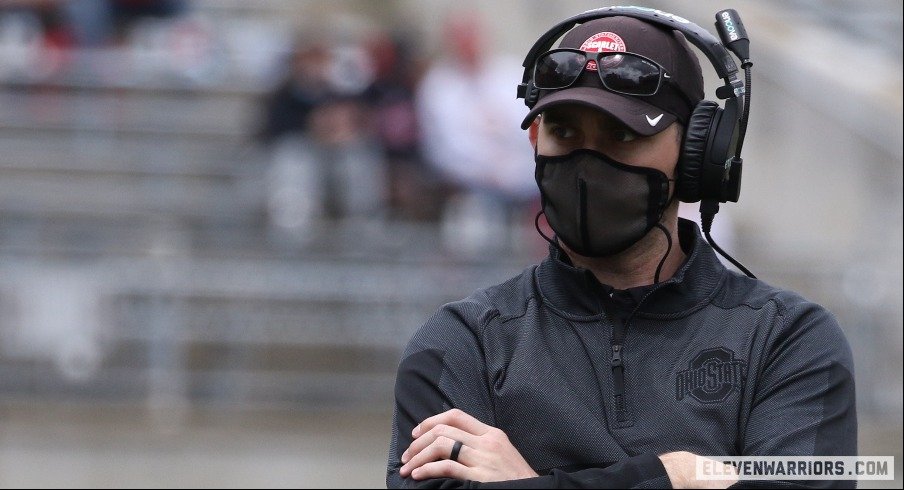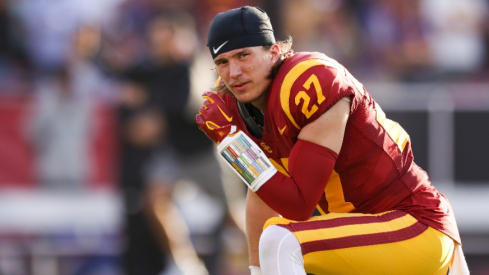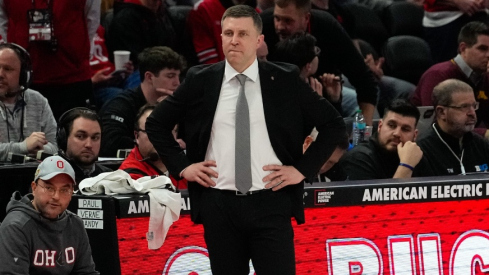Parker Fleming had never coached special teams before when he initially joined Ohio State’s coaching staff in 2012.
After playing quarterback in high school and at Presbyterian College and coaching quarterbacks at his high school for a year and at Capital University for a year, Fleming found out that new Ohio State coach Urban Meyer had a special teams internship available, and he felt like he had to go for it.
“I was just looking for any opportunity to be a part of this program,” Fleming recalled this spring. “I didn’t really know what it meant. I wasn’t exactly sure what the details were gonna be. And I just kind of said, ‘I’ll do whatever you need. Anything. Count me in.’ And getting to learn from Coach Meyer early – not just the system, because it’s really not about the system of plays, it’s about just the entire culture of the building – was huge.”
That set Fleming on a course toward the job he has now at Ohio State, where he was promoted to special teams coordinator in February.
After his initial two-year stint at Ohio State, Fleming became the wide receivers coach at James Madison. After two years there, he spent two years at Texas State, starting as the wide receivers and special teams coach for one year then becoming the co-offensive coordinator and quarterbacks coach. Upon returning to Ohio State in 2018, however, Fleming went back to coaching special teams, first as a quality control coach and now as one of the Buckeyes' 10 on-field assistants.
The 33-year-old said “it’s a huge honor” to be the Buckeyes’ special teams coordinator, and now, he wants to build upon Ohio State’s existing reputation for excellence in the third phase of the game.
“At this place, the tradition, the history and all the work everybody’s put in before me, I just hope to kind of keep that going and enhance it as best as I can,” Fleming said. “I’ve been around here for a little bit of time, kind of know the system and kind of know the ins and outs of the place. And so one of the main goals is to just try to keep some continuity and enhance what we’re doing without a huge turnover and a huge change and that’s one of those things that I’m very fortunate to be in this position that I feel like I’m capable of doing it.”
He’ll do that with the assistance of Ohio State’s previous special teams coordinator, Matt Barnes, who is now the Buckeyes’ secondary coach. Fleming worked closely alongside Barnes for the past two years, and he’s glad to still have Barnes available to him as a resource as he becomes the leader of the special teams unit.
“In a lot of ways, I feel like I was his sounding board for the past couple of years. He had a great background, and I helped in the continuity of things that had been here before he got here. But he really took it and ran and did his thing, and obviously did a great job, and that’s kind of what he is right now for me is a sounding board of ‘Hey, what do you think about this?’” Fleming said. “And the other thing is during drills, because he understands what we’re trying to do well, he can help take a group of these guys and go do specifically exactly what we need. And there’s just a little bit less learning curve for a guy that doesn’t quite know the ins and outs as well when they’re running some of the drills in the spring. And it’s been huge, really helpful.”
Barnes expects Ohio State’s special teams to only get better with Fleming’s leadership.
“I think Parker Fleming is an outstanding football coach,” Barnes said this spring. “I don’t think he’s good, I don’t think he’s great, I think he’s elite.”
“At this place, the tradition, the history and all the work everybody’s put in before me, I just hope to kind of keep that going and enhance it as best as I can.”– Parker Fleming on becoming Ohio State's special teams coordinator
Certainly, there are ways in which Fleming – who’s also spending some time working with the defensive backs and the defense, as Barnes had when he was special teams coordinator – can enhance Ohio State’s special teams. One area that stands out is the return game, where Ohio State hasn’t had a kickoff return touchdown since 2010 or a punt return touchdowns since 2014, and Fleming acknowledged that the Buckeyes “gotta get some guys hitting some home runs” in that phase of the game.
One thing many people say about Fleming, though, is that he’s a student of the game who’s always looking to expand his knowledge of the game and come up with new concepts. His intelligence and attention to detail got him to this point, and it’s why he has many believers within the Woody Hayes Athletic Center.
“I watch everybody, any film they’ll let me have,” Fleming said. “So we’ll go find some explosive kickoff returns from the last couple of years with the current rules and watch them and evaluate what are other teams doing well … punt block, same type of thing.
“In-season, you kind of have to keep up with the current trends. So a play will happen and it’ll get on SportsCenter or teams will watch it and then you gotta expect that other teams are gonna do that, so that’s the big, big part. But the little things, yeah, you gotta go back and see what’s worked against the opponent or the coordinator that you’re facing years back. As far back as they’ve really been in control. And just see what has been effective, what has not, can we enhance, can we continue and it’s everybody. NFL, college, high school, whatever’s out there, we’ll try and find and try and get an advantage from.”
With recent rule changes like allowing teams to fair catch kickoffs, one could argue that special teams aren’t as important as they used to be. But that’s never been the approach at Ohio State – not with Ryan Day and certainly not with Meyer or Jim Tressel before him – and it won’t be as long as Fleming has something to say about it.
“Special teams is dying in certain ways, but it’s definitely not dying at all in terms of impact of the game,” Fleming said. “So you can choose, if you want, to view it that way. Or you can choose that it’s a weapon because if the opponent sees it like that, good. We don’t. So how do you take the current rules and make them an advantage for us?
“But the weapon of our punt team, our punt return team, our punt block team, downing punts inside the 10-yard line; situational football, knowing our hands on onside, those will never go away. And as much as they work in other ways to change and evolve the rules so special teams has a different impact, the overall impact will never go down. It just won’t. The ball moves too far every play for the impact to not be at an all-time high. And until they limit how far you can kick a ball, that won’t change. Because the field position is just such a difference in winning and losing, and that’s really what we’re in charge of is how much of the battle of field position can we impact.”


